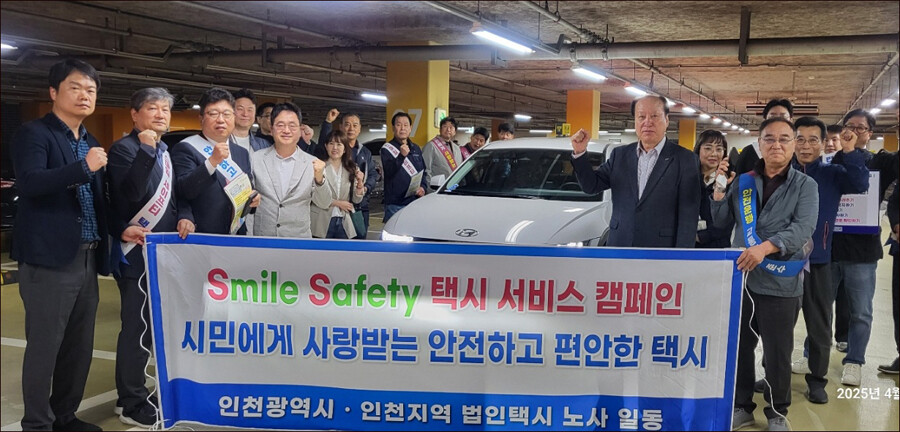
INCHEON, South Korea – The Incheon Metropolitan City government and the local corporate taxi industry joined forces on April 18th in a significant campaign aimed at bolstering taxi service standards within the city. The initiative, marked by a rally held in the Songdo International City area, underscores a mutual commitment to ensuring law-abiding operations and elevating the level of customer service provided to Incheon residents and visitors alike.
The campaign event witnessed the participation of key stakeholders from both the industry and the government. Among the attendees were Choi Chang-kyung, Chairman of the Incheon Taxi Transportation Business Association; Cho Yoon-joo, Chairman of the Incheon Regional Headquarters of the National Taxi Workers' Union; and Lee Jung-gi, Head of the Incheon Regional Headquarters of the Democratic Taxi Workers' Union. Approximately 30 representatives, including labor and management figures from the corporate taxi sector, as well as officials from the Incheon Metropolitan City, were present to demonstrate their unified commitment to the cause.
During the campaign, corporate taxi drivers in attendance made a solemn pledge to actively uphold traffic laws and provide courteous service, emphasizing their dedication to earning and maintaining the trust of the Incheon citizenry. This commitment comes at a crucial time as urban transportation services play a vital role in the daily lives of residents and the overall image of the city.
Choi Chang-kyung, Chairman of the Incheon Taxi Transportation Business Association, articulated the industry's resolve, stating, "We will faithfully implement the tripartite agreement reached last month between labor, management, and the government. Our utmost priority is to realize a safe and comfortable taxi service that resonates positively with the citizens of Incheon." This statement highlights the collaborative spirit underpinning the campaign and the industry's willingness to work hand-in-hand with both labor unions and the city administration.
Echoing this sentiment, Chae Kyung-shik, Head of the Incheon Metropolitan City's Taxi Transport Division, affirmed the government's commitment to improving taxi services. "The Incheon Metropolitan City is dedicated to making every possible effort to enhance taxi services in a tangible way that citizens can experience and appreciate," Chae stated. This declaration underscores the city's proactive stance in addressing potential issues within the taxi service sector and its responsiveness to the needs and expectations of its constituents.
Context and Need for the Campaign
The campaign comes amidst ongoing efforts in South Korean metropolitan areas to refine public transportation services, including taxis, to meet the evolving demands of a modern urban environment. Issues such as ride-hailing service regulations, fare adjustments, driver welfare, and service quality frequently garner public attention. Incheon, as a major port city and economic hub, recognizes the importance of a reliable and customer-centric taxi service for its residents, businesses, and international visitors.
Recent discussions and initiatives across South Korea have focused on improving the overall passenger experience in taxis. This includes ensuring drivers adhere strictly to traffic regulations to enhance safety, maintain vehicle cleanliness and comfort, and practice professional and courteous interactions with passengers. Campaigns like the one in Incheon often serve as a visible demonstration of the industry's commitment to these principles.
Potential Areas of Focus and Improvement
While the article highlights the pledge for law-abiding operation and courteous service, a comprehensive improvement in taxi services can encompass several key areas. These may include:
Driver Training and Professional Development: Enhanced training programs focusing not only on safe driving practices and traffic laws but also on customer service skills, effective communication, and handling diverse passenger needs.
Technological Integration: Leveraging technology to improve service efficiency, such as GPS-based dispatch systems for quicker pick-ups, digital payment options for passenger convenience, and potentially incorporating feedback mechanisms through mobile applications.
Vehicle Maintenance and Safety Standards: Ensuring that all taxis undergo regular maintenance checks to guarantee passenger safety and comfort. This includes the cleanliness of vehicles and adherence to safety regulations.
Addressing Passenger Complaints: Establishing clear and efficient channels for passengers to lodge complaints and ensuring that these are addressed promptly and effectively. This builds trust and accountability within the service.
Fair Fare Practices: Maintaining transparent and fair fare structures and ensuring drivers adhere to these regulations, addressing concerns about potential overcharging.
Accessibility: Improving the accessibility of taxi services for passengers with disabilities, potentially through a greater availability of accessible vehicles and driver training on assisting passengers with special needs.
Integration with Other Public Transportation: Exploring ways to better integrate taxi services with other modes of public transportation, such as buses and subway lines, to provide a seamless transportation network.
Broader Implications and Future Outlook
The collaborative nature of this campaign in Incheon, involving the city government, the taxi operators' association, and the labor unions, signals a unified approach to addressing challenges and fostering a more positive image of the taxi service. The commitment to a tripartite agreement, as mentioned by Chairman Choi, suggests a framework for ongoing dialogue and cooperation to ensure sustained improvements.
The success of this campaign will likely be measured by tangible improvements in passenger satisfaction, a reduction in complaints related to service quality or traffic violations, and an overall enhanced perception of Incheon's taxi services. Continuous monitoring, feedback mechanisms, and further initiatives may be necessary to solidify these gains and adapt to the evolving needs of the city.
In conclusion, the joint campaign launched by Incheon City and its corporate taxi industry represents a significant step towards fostering a more reliable, safe, and customer-friendly taxi service. The pledges made by drivers and the commitment expressed by both industry leaders and government officials indicate a positive direction for urban transportation in Incheon. The focus on law-abiding operations and enhanced customer service is crucial for building public trust and ensuring that taxis remain a vital and respected component of the city's transportation infrastructure. Future efforts will likely involve a continued focus on training, technology, safety, and responsiveness to passenger needs to achieve lasting improvements.
[Copyright (c) Global Economic Times. All Rights Reserved.]




























